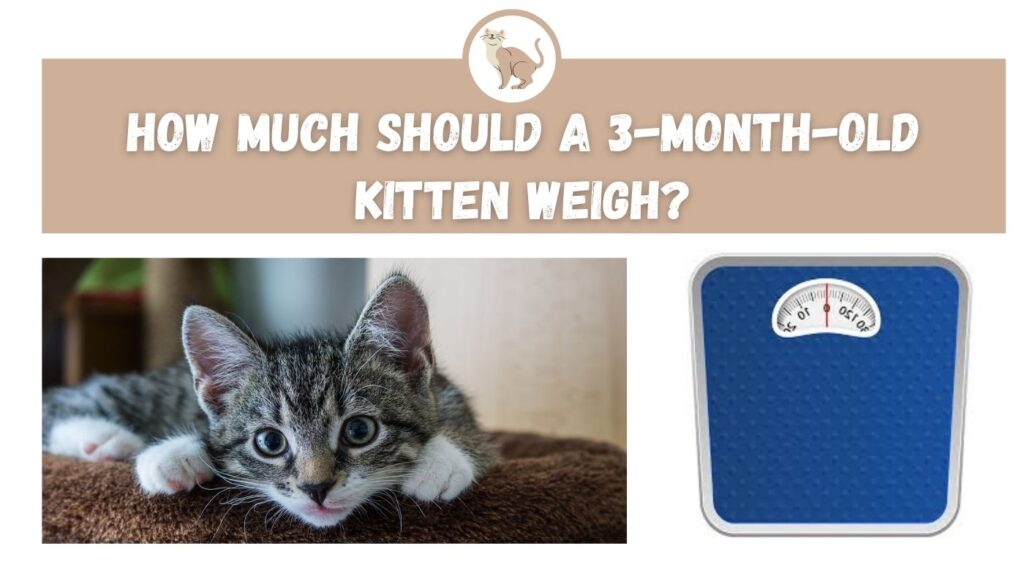As a general rule of thumb, growing kittens under 6 months of age will weigh almost their age in months. So,
- A 2-month-old kitten generally weighs between 1.4 and 2.6 pounds. They have an average weight of 2 pounds.
- A 3-month-old kitten is expected to weigh between 2.2 and 4 pounds. They weigh approximately 3 pounds as a median.
- A 4-month-old kitten should average 4 pounds, and so on.
The average weight of your 3-month-old kitten is around 900 g – 1300 g. This is generally the age where kittens wean from breastfeeding. So, you will no longer be feeding them every couple of hours.
When to weigh a 3-month-old kitten?
We suggest that you should weigh your kitten in the following circumstances:
- If it’s having a major growth spurt and goes through a significant change in size or weight
- If you think something is wrong with your kitten.
Weighing your kitten every week will really help you track their progress. This will help you to catch any problems at an early stage before they turn serious.
How to weigh a 3-month-old kitten?
Your 3-month old kitten should be weighed on a flat surface. If you have a baby, you can use his scale to weigh your kitten. You can use a small digital scale to weigh your kittens such as a kitchen scale. In both cases, remember to disinfect the scale before and after use!
Tips for healthy kitten weight gain
Your kitten’s overall growth may be affected by several factors like genetics, diet, parasites, illnesses, surgeries, and other factors. Here’s how you can ensure your kitten is growing at a healthy rate:
- Age-appropriate food: Always feed your kitten age-appropriate food. Keep in mind that kittens and adult cats have varied nutritional needs. If you notice your cat has a sensitive stomach, you should check out my article on the best cat food for hairballs and vomiting.
- Follow the feeding guidelines: Always use the feeding guidelines on your food packaging as a starting point for how much to feed your kitten. You can adjust the quantity of food over time as your kitten grows. Make sure that your cat always has a bowl of fresh water next to his/her food bowl. You can also try switching between dry and wet cat food in order to see which one you cat prefers.
- Offer multiple small meals: Feed your kitten various small meals every day instead of one big meal. Their stomach is small so it digests smaller meal better than large ones.
- Avoid giving dietary supplements without consulting the vet: Don’t add dietary supplements or vitamins unless specifically advised by your vet. It’s possible that excess amounts of certain nutrients can cause health problems.
- Monitor your kitten: The weight and body condition of your kitten should be monitored regularly. You can always speak to your vet if you have any questions. Your vet will probably weigh your cat every time you bring them in, and let you know if they have any concerns.
- Monitor their stool: The health of a kitten can also be monitored by checking their stool regularly. You should look for the presence of any parasites. You should also check out my article on why does my kittens poop smell like death if you notice their poop smells bad.
What if my kitten is losing weight?
Healthy and active kittens should never lose weight. If your kitten is losing weight, this might be a sign of illness. It’s always best to talk to your vet and address this issue immediately. It is especially a cause of concern if your underweight kitten also has symptoms of sickness.
Kittens are at a growing stage and their immune systems are not fully developed. So, they’re much more susceptible to parasites, viruses, and other infections than adult cats. To learn more, check out my article on when do cats stop growing?
Can kittens be overweight?
Yes, this is possible. Common causes of kittens being overweight include
- overfeeding
- overindulgence in kitty treats or table scraps
- an inactive lifestyle
- changes in kitten’s weight after a spay or neuter surgery
An overweight kitten often translates to obesity in adulthood. Also, there are associated health risks including arthritis, diabetes, or heart and lung problems.
If you feel that your kitten is overweight, don’t restrict their daily food right away. It’s better to talk to your vet about the best weight management plan for your kitten.
Wrapping up
Having a 3-month-old kitten is a real pleasure. At this stage, your kitten has become very active and is on its way to becoming fully independent.
Weight is usually the number one problem in kittens. Every 3-month-old kitten’s weight will vary. The important thing is that the kitten is making progress. A 3-month-old kitten who is not growing is usually sick or may not be getting enough nutrition. If the kitten is underweight or losing weight, bring the little creature to a vet immediately.
Don’t worry if your 3-month-old kitten doesn’t follow this weight formula exactly, though. Each little kitty is unique. As long as your kitten seems healthy, energetic, and active, you don’t need to worry.

